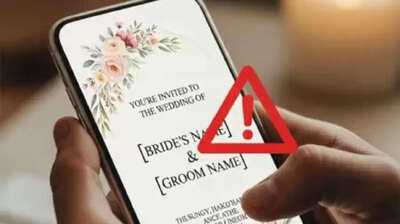Today's world has become completely digital. Almost everything is digital. Now you can do everything online through the internet. People even send wedding cards online via WhatsApp, and this trend has been increasing significantly in the last few years.
As the wedding season begins, scammers have found a new way to defraud people. They are now sending wedding cards online. As soon as people click on the link pretending to be a card, money is disappearing from their bank accounts.
These fake cards look real and are sent with beautiful designs. The card contains a link or QR code, which, when clicked, downloads malware onto the phone or computer. This gives fraudsters access to your bank details.
In many cases, scammers pose as relatives or old friends. They send cards via text or WhatsApp, saying, "Open it quickly, it's a wedding invitation." Trusting people, they click, leaving their accounts compromised.
These fraudsters steal information through bank apps, UPI, and payment platforms. As soon as you open the link, your OTP and login data are tracked from your mobile. Within seconds, your bank balance disappears without you even realizing it.
Cybersecurity experts advise against clicking on any unknown links or digital cards. If you receive a wedding invitation, inquire about it first through a call or message. Opening a link without trust is inviting danger.
If you accidentally open such a link, immediately contact your bank and the cybercrime helpline 1930. Also, change all passwords and remove suspicious apps from your mobile. By taking timely action, major losses can be prevented.
You may also like

What happened to Jimmy Kimmel? Live show cancelled at last minute with no explanation

Is Stephen Curry playing tonight vs the Denver Nuggets? Latest update on the Golden State Warriors star's injury report (November 7, 2025)

"Before 2005, govt treasury was looted": Nitish Kumar addresses Biharis, highlights state's journey from disaster neglect to progress

Maharashtra CM Honors Women's Cricket World Cup Champions with Cash Rewards

James D. Watson, co-discoverer of DNA's double helix shape, dead at 97







